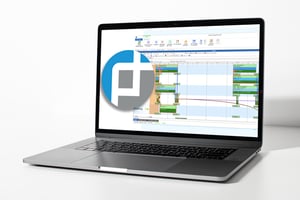Automated Scheduling for Constraint Optimization
As a Production Planner, you're constantly juggling various constraints - from ingredient availability to machine capacity and labor resources - all while striving to meet demand and maintain quality standards. It's a delicate balancing act that often leaves little room for error.
However, with advancements in technology, particularly in the realm of automated scheduling, there's a game-changing solution on the horizon. By integrating sophisticated scheduling software like PlanetTogether with leading ERP, SCM, and MES systems such as SAP, Oracle, Microsoft, Kinaxis, and Aveva, you can unlock a new level of efficiency and precision in production planning.
In this blog, we'll look into the concept of automated scheduling for constraint optimization and explore how it can revolutionize operations in Food and Beverage manufacturing.

What is Constraint Optimization?
At its core, constraint optimization is about maximizing output while operating within the limitations imposed by various constraints. These constraints can range from finite resources like raw materials and equipment to regulatory requirements and market demand fluctuations. The goal is to find the optimal balance that minimizes costs, maximizes throughput, and ensures on-time delivery.
Traditional manual scheduling methods often struggle to effectively navigate these complexities, leading to inefficiencies, missed deadlines, and increased costs. This is where automated scheduling solutions step in, leveraging advanced algorithms and real-time data integration to dynamically adjust production schedules in response to changing conditions.
![]()

The Role of Automated Scheduling
Automated scheduling software, such as PlanetTogether, acts as a central nervous system for your production operations. By ingesting data from various sources - including ERP, SCM, and MES systems - it creates a comprehensive digital model of your manufacturing environment. This model takes into account all relevant constraints, from machine capacities and labor availability to order priorities and delivery deadlines.
Using this model, the software generates optimized production schedules that align with your strategic objectives and operational constraints. It can dynamically adjust schedules in real-time as new information becomes available, allowing you to quickly adapt to changes in demand, supply, or resource availability. This agility is crucial in today's fast-paced market, where flexibility and responsiveness are key competitive advantages.

Integration with ERP, SCM, and MES Systems
The true power of automated scheduling lies in its seamless integration with your existing IT infrastructure. By connecting with ERP, SCM, and MES systems such as SAP, Oracle, Microsoft, Kinaxis, and Aveva, scheduling software can tap into a wealth of data to drive informed decision-making.
For example, integration with ERP systems provides access to critical information such as sales forecasts, inventory levels, and production orders. This real-time visibility allows the scheduling software to generate accurate production plans that align with demand projections and inventory targets.
Similarly, integration with SCM systems enables better coordination of the supply chain, ensuring that raw materials and components are available when needed. By factoring in lead times, transportation constraints, and supplier capabilities, the scheduling software can optimize production schedules to minimize stockouts and excess inventory.
Meanwhile, integration with MES systems provides granular visibility into production processes, including machine performance, downtime events, and quality metrics. This data allows the scheduling software to identify bottlenecks, allocate resources efficiently, and optimize production sequences for maximum throughput.

Benefits of Automated Scheduling for Constraint Optimization
The benefits of automated scheduling for constraint optimization in Food and Beverage manufacturing are manifold:
Improved Efficiency: By dynamically optimizing production schedules in response to changing conditions, automated scheduling software maximizes resource utilization and minimizes idle time, leading to higher throughput and lower costs.
Enhanced Flexibility: With the ability to quickly adapt to changing demand, supply, or resource constraints, automated scheduling allows manufacturers to respond proactively to market fluctuations and customer preferences.
Reduced Lead Times: By streamlining production processes and minimizing bottlenecks, automated scheduling software shortens lead times, allowing manufacturers to fulfill orders more quickly and improve customer satisfaction.
Better Resource Allocation: By intelligently allocating resources such as raw materials, equipment, and labor, automated scheduling software ensures that production capacity is used efficiently, reducing waste and maximizing profitability.
Improved Quality and Compliance: By optimizing production sequences and minimizing disruptions, automated scheduling software helps ensure consistent product quality and compliance with regulatory requirements.
Automated scheduling for constraint optimization represents a significant opportunity for Food and Beverage manufacturers to improve efficiency, flexibility, and competitiveness. By leveraging advanced scheduling software such as PlanetTogether and integrating with ERP, SCM, and MES systems, manufacturers can optimize production schedules to maximize throughput, minimize costs, and ensure on-time delivery.
As a Production Planner, embracing automated scheduling is not just about adopting new technology; it's about embracing a mindset of continuous improvement and innovation. By harnessing the power of data-driven decision-making and real-time optimization, you can unlock new levels of efficiency and agility in your production operations, positioning your company for long-term success in today's rapidly evolving market.
Are you ready to take your manufacturing operations to the next level? Contact us today to learn more about how PlanetTogether can help you achieve your goals and drive success in your industry.
Topics: PlanetTogether Software, Reduced Lead Times, Integrating PlanetTogether, Improved Quality and Compliance, Improved Efficiency, Better Resource Allocation, Enhanced Flexibility and Adaptability, Food and Beverage Manufacturing




















LEAVE A COMMENT